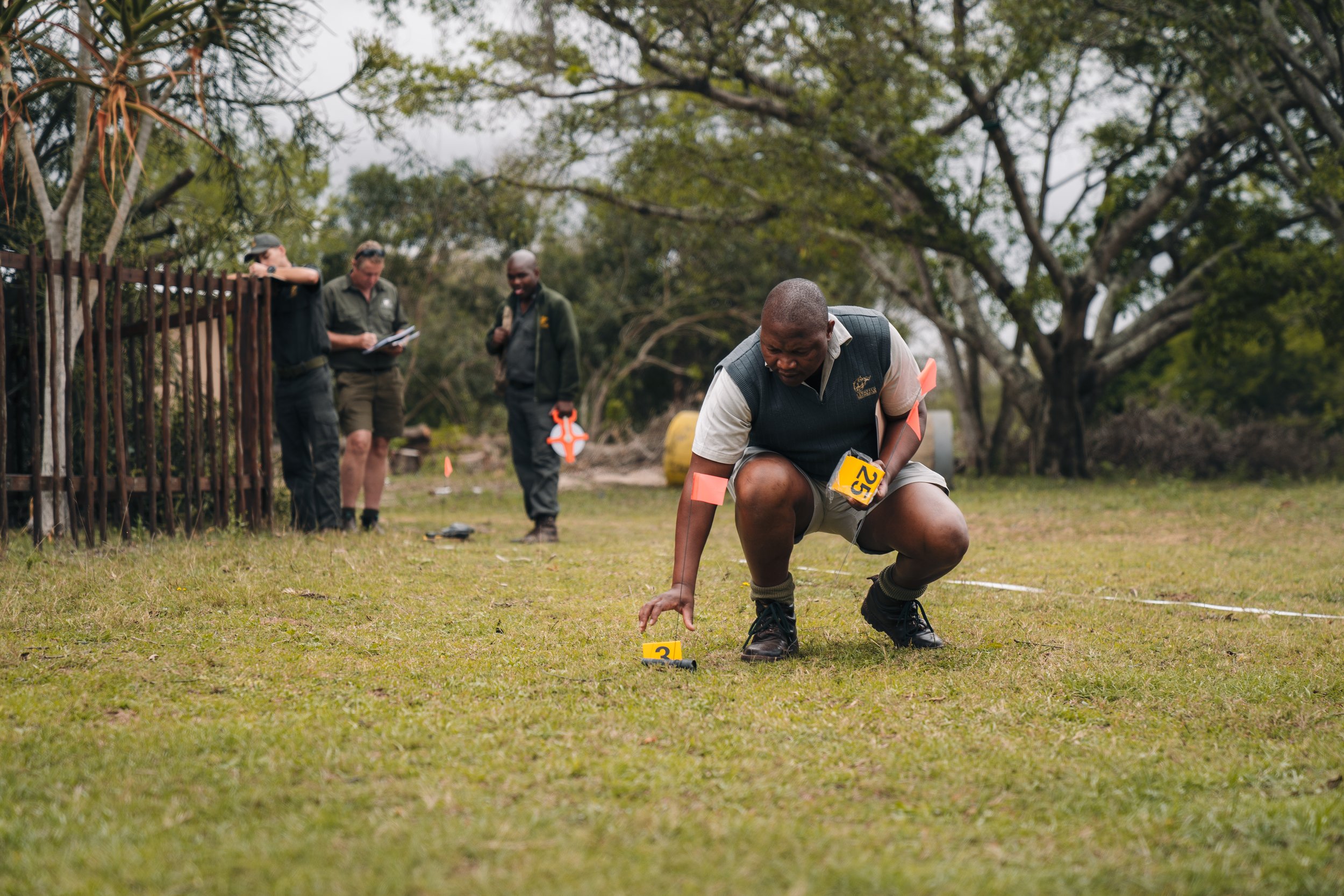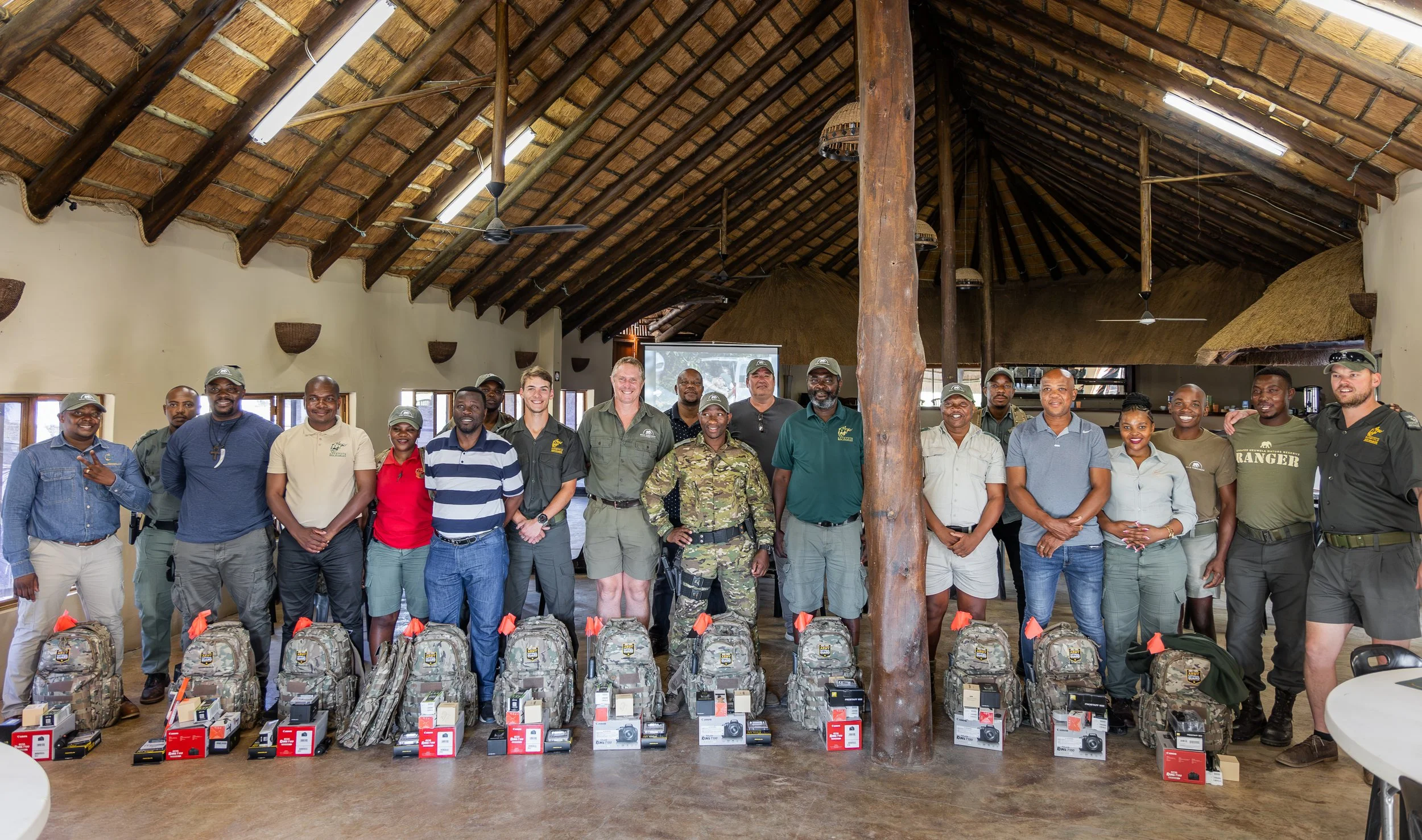WILD TOMORROW AND WILDLIFE DEFENSE HOST CSI TRAINING, FUNDED BY U.S. EMBASSY
In October 2024, Wild Tomorrow and Wildlife Defense, with support from the U.S. Consulate Durban, hosted a vital training program for rangers and law enforcement to strengthen their skills in forensic crime scene investigations. This training comes at a crucial time as KwaZulu-Natal faces a severe rhino poaching crisis. Read more below to find out how this initiative is helping rangers protect wildlife and increase convictions against poachers.
Wild Tomorrow, Wildlife Defense, and attendees of the 2024 Wildlife Crime Scene Investigative Techniques training pose for group photo with three representatives from the U.S. Consulate Durban. Photograph by Chantelle Melzer.
In the fight against illegal wildlife crime, empowering those on the frontlines is crucial. This October, Wild Tomorrow partnered with Wildlife Defense to host a five-day Wildlife Crime Scene Investigative Techniques (WCSIT) training. With generous funding through a public diplomacy grant award by the U.S. Consulate Durban, this specialized course provided rangers, law enforcement officers, and wildlife crime prosecutors with vital skills to combat the escalating poaching crisis in KwaZulu-Natal, South Africa.
Lieutenant Chris Didion, Wildlife Defense, presents on Crime Scene Security and Preservation. Photograph by Luke Didion.
The training took place at Wild Tomorrow’s newly established Conservation Centre in Hluhluwe, KwaZulu-Natal and focused on building forensic skills essential for processing wildlife crime scenes. Rangers from 10 reserves, including eight from Ezemvelo KZN Wildlife, Wild Tomorrow’s Greater Ukuwela Nature Reserve, and an international participant, Adams Cassinga, founder of Conserv Congo, joined the course. They were joined by law enforcement officers from the South African Police Service (SAPS), making this a comprehensive and collaborative effort against wildlife crime.
TRAINING FOR A REAL WORLD CRISIS
South Africa is home to 80% of the world’s rhinos, yet this population faces daily threats from poachers driven by the demand for rhino horn. KwaZulu-Natal, once less targeted, has become a major focus for poachers. In 2023 alone, 325 rhinos were killed in the region – nearly one per day. Many of the reserves that participated in this training face poaching incursions regularly, making this course all the more essential.
The WCSIT training, led by U.S. environmental crime specialists from Wildlife Defense, covered a wide array of topics, including crime scene security, forensic photography, DNA evidence collection, and courtroom testimony. The course culminated in a mock poaching scenario, where participants practiced securing and processing a wildlife crime scene.
Photographs below courtesy of Chantelle Melzer and Luke Didion.
Each participating reserve received a forensic kit to aid in future crime scene investigations. These kits contained vital tools such as DNA collection swabs, evidence bags, audiovisual equipment, and more – ensuring that rangers are better prepared to handle wildlife crime scenes in the field.
A member from each reserve/entity poses proudly with their new forensic kits!
THE POWER OF COLLABORATION
“Globally, the U.S. government embraces a three-pronged strategy toward wildlife trafficking that involves strengthening law enforcement, reducing demand, and fostering international cooperation. Our approach to combating wildlife trafficking is rooted in a commitment to collaboration, where we prioritize learning from and working alongside South Africa’s experts. The United States is honored to support South Africa’s dedicated rangers and law enforcement professionals through training initiatives that are designed to meet their needs. We recognize this as a critical effort to address poaching in the region, and it is South Africa’s leadership, expertise, and deep understanding of local realities that drive this mission forward. We are proud to stand as a partner in this effort, supporting those on the front lines as they protect South Africa’s extraordinary wildlife and bring perpetrators to justice.”
Mthokozisi Cele, Provincial Security Manager at Ezemvelo KZN Wildlife, shared his thoughts on the training: “The training program came at the perfect time, given the evolving crime patterns and the increasingly sophisticated methods employed by criminals. This training is crucial as it focuses on the use of DNA and trace evidence, such as fingerprints, to enhance investigative efforts. We have gained valuable knowledge on identifying and securing crime scenes, as well as following proper procedures for processing, collecting, and packaging evidence—covering the entire crime scene management value chain. As Ezemvelo, we are grateful to have participated in this training, offered by Wild Defense in collaboration with Wild Tomorrow.”
Tori Gray, Project Manager at Wild Tomorrow, added, “This training was an incredible opportunity to provide rangers with hands-on forensic skills that can make a real difference in the fight against poaching. The enthusiasm and engagement from everyone involved was inspiring, and we are thrilled to have been part of this crucial initiative.”
A LOOK TOWARD THE FUTURE
As the poaching crisis continues, Wild Tomorrow and Wildlife Defense are committed to continuing our efforts to train rangers in critical forensic and investigative techniques. By equipping rangers with the skills and tools needed to handle wildlife crime scenes, these trainings help improve conviction rates and send a clear message to poachers that their actions will not go unpunished. The success of this year’s training is just the beginning, and we look forward to expanding these vital programs to protect South Africa’s wildlife for years to come.












